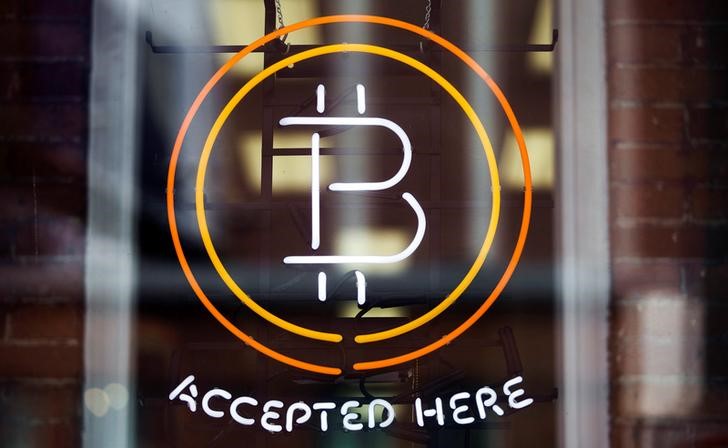By Yasin Ebrahim and Peter Nurse
Investing.com -- Bitcoin is on the cusp of history once again. The popular crypto is nearing the $20,000 milestone for the first time since 2017. But unlike the rally of yesteryear, which was largely fueled by speculation, FOMO and irrational exuberance, this latest surge bears the hallmarks of a real staying power.
The next step is real-world acceptance of it as a currency for transactions, not just a curiosity. And that still seems a long way off.
Investing.com's Yasin Ebrahim argues the bull case for bitcoin, while Peter Nurse gives us plenty of reason for skepticism. This is Point/Counterpoint.
The Bull Case
The underlying demand in this rally is not one that appears fleeting in nature, driven mostly by retail investors looking to make a quick buck. This time, bitcoin has finally caught the attention of Wall Street in a big way.
Institutional investors have long been earmarked as the missing piece of the Bitcoin puzzle. Not only do they boast clients with larger portfolios, but they have the investment nous to appreciate the characteristics of bitcoin that make it a mainstay in portfolios during the current macroeconomic environment.
Faced with a wave of lower interest rates that are likely to keep fiat currencies on the backfoot, investors are desperate for a hedge against currency debasement. Gold Futures, the usual go-to hedge has lost some of its edge. And bitcoin, while unlikely to usurp gold, could plug the gap.
A decoupling of gold from fiat currencies, the Covid-19 pandemic and the desire for central banks to pursue aggressive quantitative easing policies could lead to future explosive price growth in bitcoin, said Thomas Fitzpatrick, global head of the company’s CitiFXTechnicals market.
Others on Wall Street have also endorsed the idea of bitcoin as a supplement, or in some cases an alternative to gold.
"There is a reassessment about its value here as an alternative currency, as an alternative to gold." said Nikolaos Panigirtzoglou, an analyst at JPMorgan.
The adoption of bitcoin from key merchants like Square Inc (NYSE:SQ) and PayPal Holdings Inc (NASDAQ:PYPL), meanwhile, will go a long way to legitimizing the use case of bitcoin, and drive up engagement.
PayPal has over 300 million active users that now will be able to use their cryptocurrency balances to pay for goods and services. PayPal's army of users have already shown a healthy level demand, prompting the fintech giant to raise its limits on crypto purchases.
PayPal increased its weekly crypto purchase limits to $15,000 from $10,000 just weeks after announcing it was entering the crypto fray on Oct. 21.
The surge in bitcoin has also been exacerbated by a theme as old as investing itself: demand and supply.
With only 21 million bitcoins in circulation, and around just 3.4 million still available to be traded, the 'bitcoin rush' is on.
The Bear Case
This is a bubble caused by a temporary bout of weakness in the world economy. Real-world acceptance is still a far-off dream, leaving the asset doomed to irrelevance in the world of trade, investment and even payments.
Unless you can pay your taxes, your employees and suppliers in it, there is no final demand for this product, except perhaps in the market for illicit goods and services! That will stop it going to zero. Unless it can be used to multiply capital, it is not an investment. It is an asset, but a purely speculative one, and one thing we know about speculative bubbles is that eventually they burst.
One of the side effects of the trillions of dollars central banks around the world have injected into the global economy via quantitative easing to combat the coronavirus crisis has been the creation of asset bubbles, of which Bitcoin is a prime example. Its price has increased from under $5,000 in late March to currently stand at around $18,000.
The European Central Bank has all but guaranteed more largesse in December, and the Federal Reserve could well follow suit to buttress against the impact of the recent surge in Covid-19 cases. However, the recent positive vaccine news surely means this will be the last hurrah for QE, and then what for the cryptocurrency?
After all it’s been more than 10 years since its invention and widespread applications are very thin on the ground, not nearly enough to justify this lofty valuation.
Any thinking that bitcoin could be used as a reserve currency has hit the skids - no country wants another parallel currency that they can’t even attempt to control. Similarly, it doesn’t really work as a medium of exchange as it’s not accepted in a widespread manner, nor as a store of wealth given its volatility.
This means that Bitcoin works similarly to gold, i.e. an asset with a limited supply that doesn’t generate income. Yet gold is only up 20% year-to-date, as opposed to Bitcoin’s 150% gain.
There’s also the worry about what happens when the Federal Reserve starts to raise interest rates and rival investments start to generate reasonable levels of income. This may not happen near term, but Treasury yields have already started to climb, admittedly from a low base. The yield on the benchmark 10-year is up almost 8% this month.
With such a sharp move higher already behind it, and with the Bitcoin savvy on the lookout for Greater Fools to sell to, significant downside is very likely.
